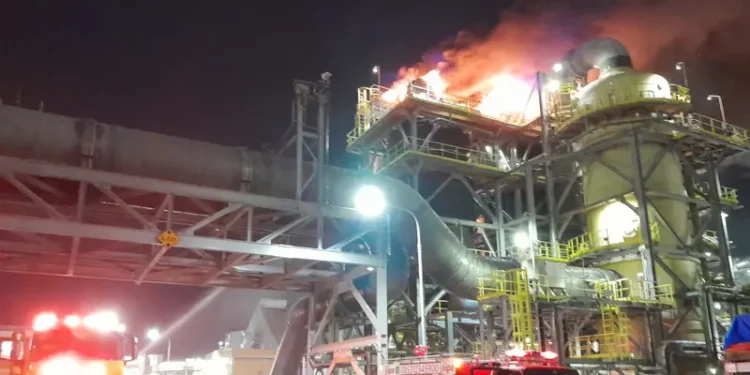Jakarta, Indonesia Sentinel — The Indonesian Ministry of Energy and Mineral Resources (ESDM) has concluded its investigation into the recent fire at PT Freeport Indonesia’s (PTFI) copper smelter in the Java Integrated Industrial and Ports Estate (JIIPE) in Gresik, East Java. The incident of Freeport fire, which occurred in October 2024, caused significant disruption to operations, halting the production of copper cathodes. Officials have now classified the event as force majeure.
Tri Winarno, Director-General of Minerals and Coal at the ESDM Ministry, confirmed the findings, stating the fire was not caused by negligence or intentional acts. “The investigation is complete, and the result indicates force majeure. If it were intentional, the insurance claim wouldn’t be processed. The facility is insured,” Winarno explained during a press briefing on February 17, 2025.
The investigation’s conclusion may open the door for the government to consider extending Freeport’s export permit, which expired on December 31, 2024. The decision to grant an extension is pending further discussions within government agencies.
“The recommendation will come from ESDM, but it’s a collaborative decision involving multiple departments,” Winarno added.
Weighing Economic Impact
Deputy Minister of Energy and Mineral Resources, Yuliot Tanjung, highlighted that the potential permit extension requires careful consideration. The government must assess the economic impact of halted operations on state revenue and the broader mining sector.
“We need to determine if the event qualifies as force majeure. The police investigation confirmed there was no deliberate misconduct,” Tanjung stated. “Additionally, we must evaluate the potential consequences for Freeport’s mining activities and their impact on national and regional income.”
Indonesia has been tightening regulations on raw mineral exports, compelling miners to process resources domestically. The Gresik smelter, with an annual processing capacity of 1.7 million tons of copper concentrate, is central to this policy. The facility also produces between 600,000 and 700,000 tons of copper cathodes annually.
Production Halt and Economic Ripple Effects
PTFI President Director Tony Wenas confirmed that smelter operations remain suspended while repairs are underway. “The plant is fully shut down for now. Repairs are ongoing, but production cannot resume until the gas cleaning plant is fully operational,” Wenas said.
The gas cleaning plant plays a critical role in converting CO2 emissions from the smelting process into sulfuric acid, which supports Indonesia’s fertilizer industry and nickel processing facilities. Wenas estimated a six-month timeline for the smelter’s recovery.
The smelter, with a cumulative investment of 58 trillion rupiah (approximately $3.67 billion), is Indonesia’s largest single-line smelter. Its operations are crucial for Freeport to fulfill its mining license obligations, granted in 2018. Once fully operational, the smelter is expected to produce one million tons of copper cathodes, 50 tons of gold, and 200 tons of silver annually.
Read Also:
Fugitive in Indonesian Bank Loans Corruption Case Arrested, 19 Years on the Run
Export Permit Decision Pending
While the fire has disrupted production, the broader implications extend to Indonesia’s copper export landscape. Freeport’s exports significantly contribute to the country’s mineral revenues. The government is now weighing whether to grant temporary export permissions to mitigate economic losses.
“The Coordinating Ministry for Economic Affairs is working with ESDM and the Ministry of Trade to explore possible solutions,” Tanjung noted. “We must balance regulatory compliance with the need to sustain economic activity.”
Indonesia’s push to expand domestic processing capacity aligns with its broader economic goals. However, the Freeport smelter fire underscores the challenges involved in implementing these policies while maintaining stable industrial growth.
As investigations conclude, industry stakeholders await the government’s decision, which could shape the future of copper exports and domestic mineral processing in Indonesia.
(Becky)


























